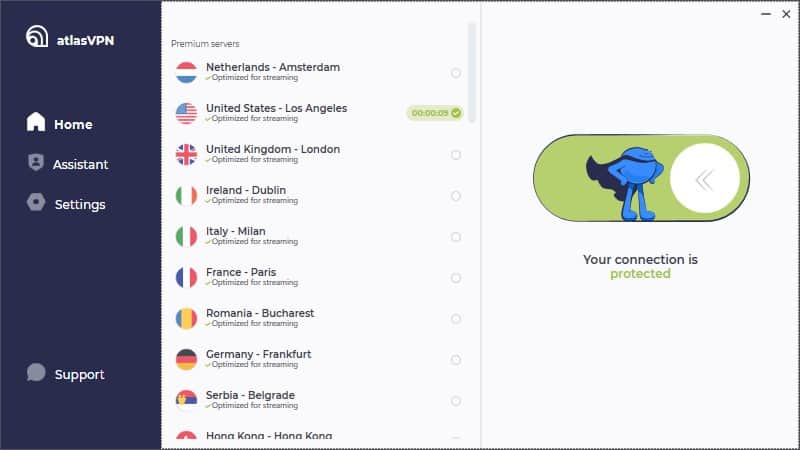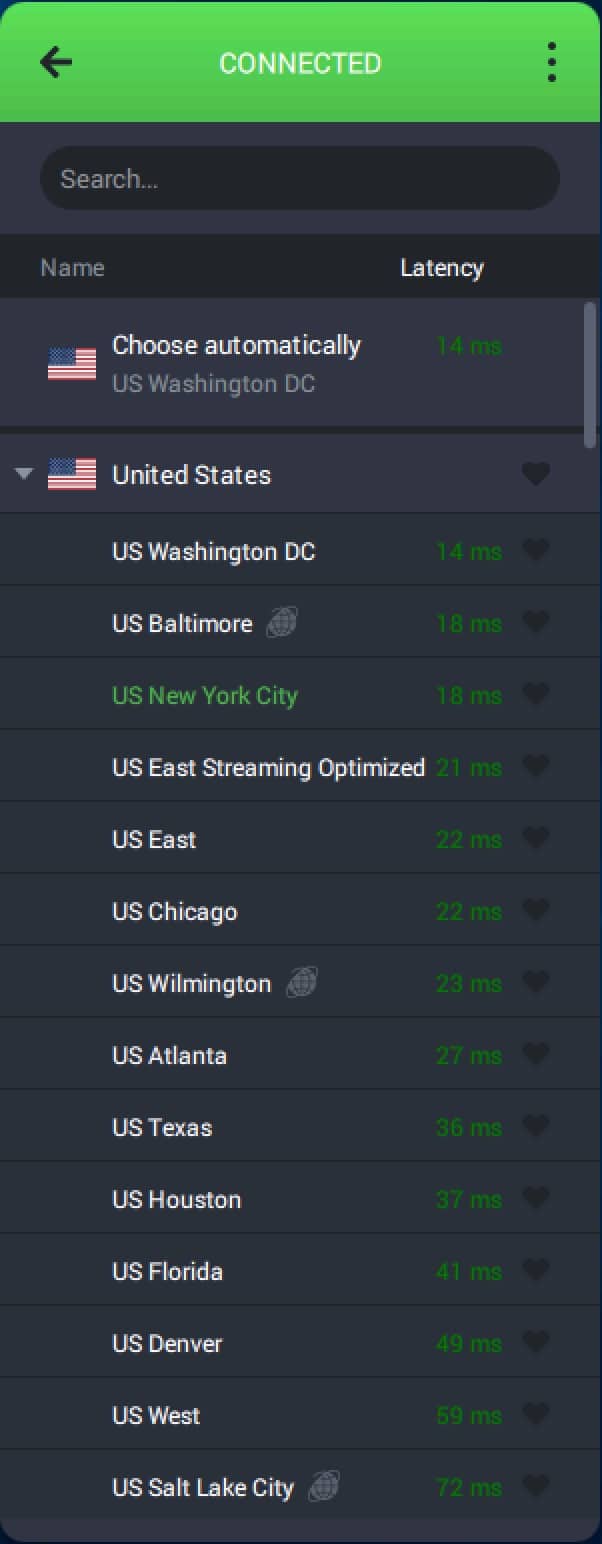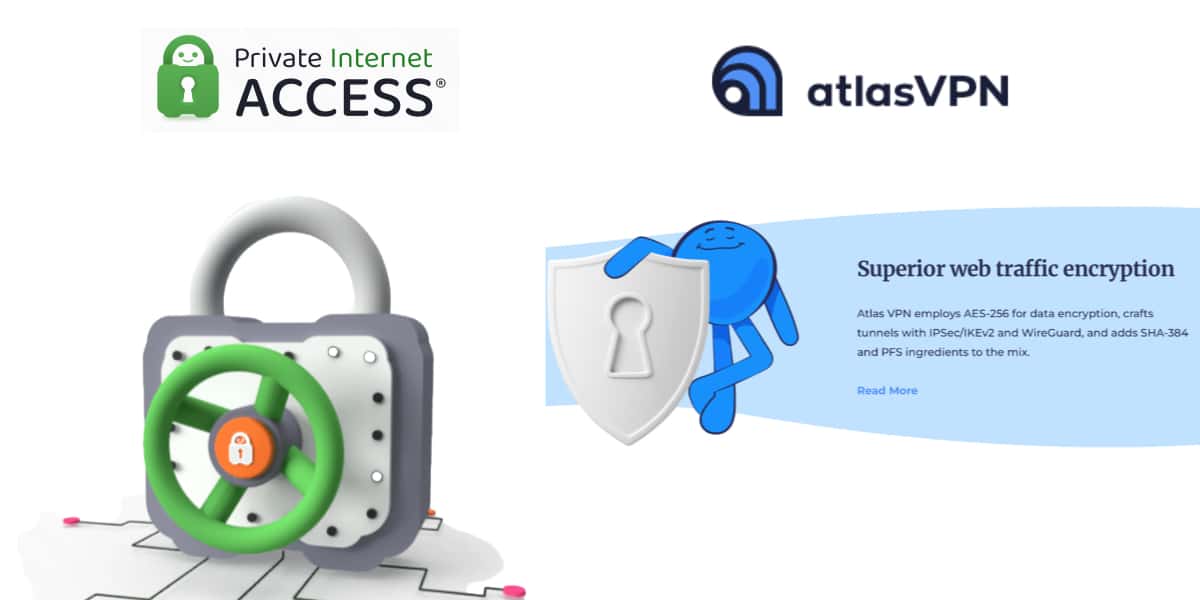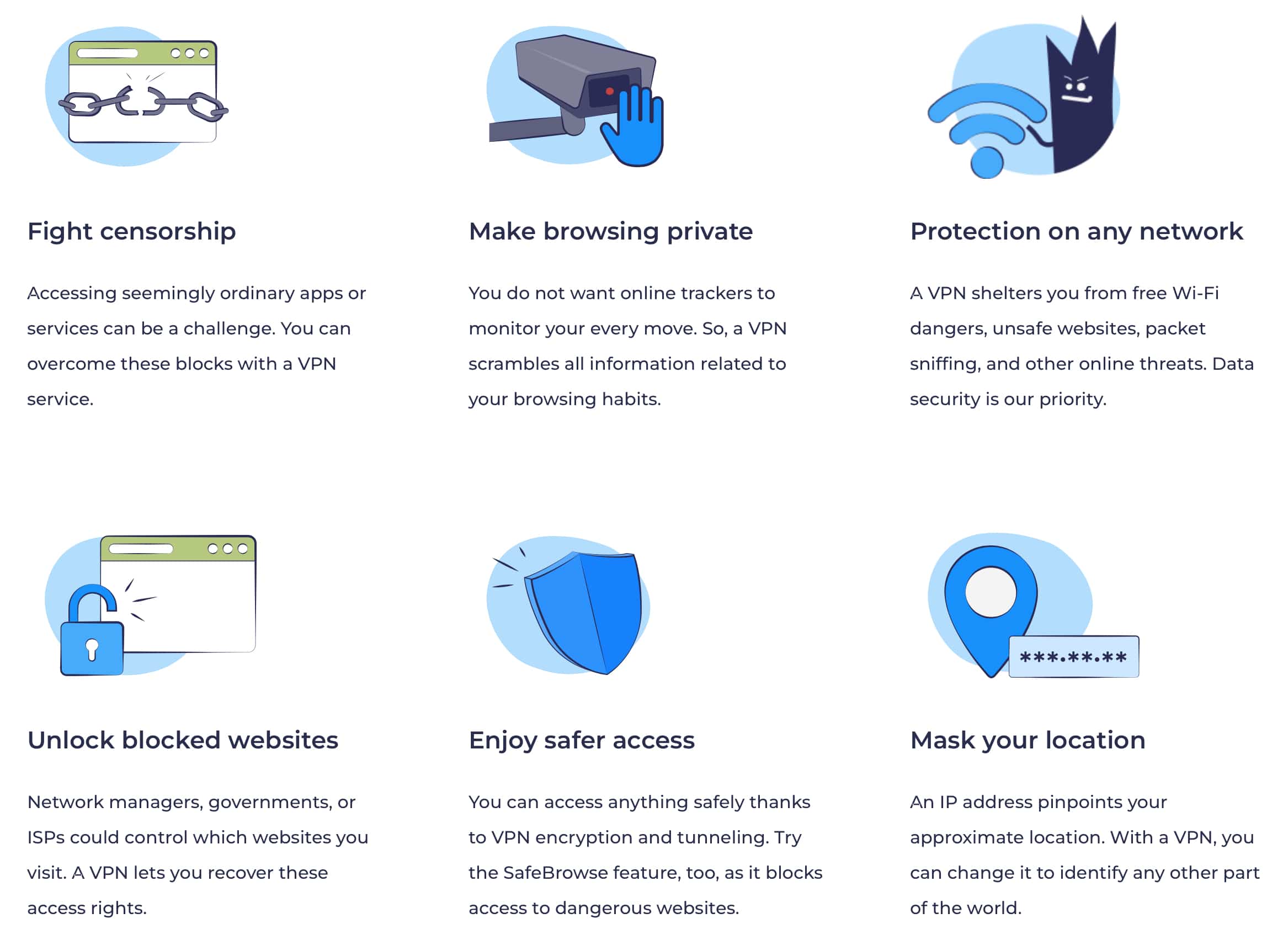Choosing between VPN providers based on their marketing alone can be tricky. To know whether a particular VPN provider will suit our needs, we need to go beyond marketing. We’re going to go through each provider’s ins and outs to determine which one should be recommended.
We’ll be comparing Private Internet Access (PIA) and AtlasVPN to see which one has the better offering.
Highlights
Private Internet Access
|
AtlasVPN
|
Private Internet Access VS AtlasVPN pricing
| PIA | AtlasVPN | |
| Subscription periods | One month | One month |
| Six months | n/a | |
| One year | One year | |
| Two years | n/a | |
| n/a | Three years | |
| Special offer | ||
| Highest price per month | $11.95 | $10.99 |
| Lowest price per month | $2.03 | $1.99 |
| One-year price | $79.00 | $39.42 |
| Money-back guarantee | 30 days | 30 days |
As you can see, AtlasVPN’s prices undercut PIA’s prices regardless of the chosen term. While the difference can come to just a few pennies, in every possible scenario, AtlasVPN will leave more in your pockets.
Regarding money-back guarantees, both providers offer the industry standard of 30 days. So regardless of which one you choose, you get the same money-back guarantee.
Private Internet Access VS AtlasVPN features
| PIA | AtlasVPN | |
|---|---|---|
| Simultaneous connections | 10 | Unlimited |
| Operating system apps | Windows, macOS, Linux, Android, iOS | Windows, macOS, Linux, Android, iOS, AndroidTV, Amazon FireTV |
| Manual install devices | Linux, routers | No |
| Split tunneling | Yes | Yes |
| Free extras | Ad & malware blocking, browser extension for Firefox, Chrome, and Opera | Tracker Blocker |
Regarding platform support, it’s pretty close, but PIA gets the edge here. They both provide apps for macOS, Windows, iOS, and Android. And they also both offer a native Linux app, which isn’t all that common. However, out of the two providers, only PIA supports routers. And unlike AtlasVPN, PIA also provides browser extensions for Firefox, Chrome, and Opera.
Both PIA and AtlasVPN include an ad/tracker blocker with their subscriptions. And again, they both support split tunneling – a popular feature that allows you to determine which apps or URLs are sent through the VPN and which are sent to your ISP gateway. With both providers, the feature is implemented on an app-by-app basis rather than by configuring specific URLs.
PIA allows up to 10 simultaneous connections, which is very generous – more than most providers. But AtlasVPN’s support for unlimited simultaneous connections will be hard to beat, even by the more generous providers. Kudos to AtlasVPN for that.
Speed
| Speed | PIA | AtlasVPN |
|---|---|---|
| North America | 98 Mbps | 260 Mbps |
| Europe | 53 Mbps | 158 Mbps |
| Asia | 200 Mbps | 356 Mbps |
| Global | 117 Mbps | 258 Mbps |
From the numbers above, it’s clear that AtlasVPN provides better speeds than PIA. I’ve known PIA to be faster than this in the past, so there’s hope that it will perform better on speed in future tests. But for now, there are no two ways about it – AtlasVPN gets the point for speed.
If VPN speed is critical, you’ll want to choose AtlasVPN over PIA.
Streaming capabilities
| PIA | AtlasVPN | |
|---|---|---|
| Streaming service | ||
| Netflix | US, UK | US, UK |
| Hulu | No | Yes |
| Sky Go | No | No |
| Amazon Prime Video | No | Yes |
| BBC iPlayer | Yes | Yes |
| Disney+ | No | Yes |
| ABC | No | No |
| CBS | No | No |
| NBC | No | No |
| ITV Hub | No | No |
| HBO Max | No | Yes |
| Channel 4 (All 4) | No | No |
While PIA does support streaming, it’s limited to just a few. It worked with Netflix US and UK. And it also worked with BBC iPlayer. But that was it.
Turning to AtlasVPN, we immediately see that its streaming support goes far beyond PIA. AtlasVPN supports many more streaming services than PIA. And because AtlasVPN was recently purchased by NordVPN’s parent company (Nord Security), you can expect its streaming support to get even better, as NordVPN is one of the best VPN providers for streaming.
So, AtlasVPN definitely takes it for streaming. If streaming over VPN is important to you, have a look at our recommended VPN providers for streaming.
China
Neither PIA nor AtlasVPN works in China. AtlasVPN went as far as stating that it has no plans to support connecting from China. It’s getting increasingly difficult to bypass China’s censorship, so it’s understandable that many VPN providers simply focus their resources elsewhere.
So whichever provider you choose between PIA and AtlasVPN, you won’t be connecting from China anytime soon.
You can look at our post listing the best VPN providers that work in China.
Setup and interface
| PIA | AtlasVPN | |
|---|---|---|
| Automatic setup wizard | Windows, macOS, Linux, Android, iOS | Windows, macOS, Android, iOS, Linux, AndroidTV, Amazon FireTV |
| Main location selection | List-based | List-based |
| Extra settings pages | Yes | Yes |
| Mobile friendly | Yes | Yes |
PIA and AtlasVPN both provide desktop apps that are well-designed and easy to understand. PIA’s main window is a bit cramped compared to AtlasVPN because its UI is smaller. And I’m not a massive fan of its elongated design for desktop. Still, the app is intuitive and functional.
AtlasVPN’s app is also straightforward to navigate and understand. You can navigate the app from the left-side pane. Server selection is list-based or task-based (for streaming). You can search for a server by country and city. If you plan on streaming, it’s recommended to use one of AtlasVPN’s streaming-optimized servers.
As mentioned, PIA’s app is a bit more cramped (elongated design), but it will still be simple enough for most VPN users. With PIA, server selection is exclusively list-based, allowing you to search for servers by region and then drill down to a specific city. PIA’s app can also automatically connect you to the fastest server in your selected region.
Both apps provide a Settings page so users can customize their settings. PIA’s app ditches the elongated design for its settings pages. PIA exposes many more options to its users, making it somewhat more complex in terms of configuration. Advanced users will appreciate this, while greener users may not know what to do with all these settings.
AtlasVPN option menus are much simpler and expose fewer settings than PIA. So AtlasVPN’s app’s settings are simpler to understand and configure. Advanced users may find the app lacking in customization and prefer PIA’s approach. It’s always a question of balance between customization and ease of use. And each VPN provider has their own design philosophy.
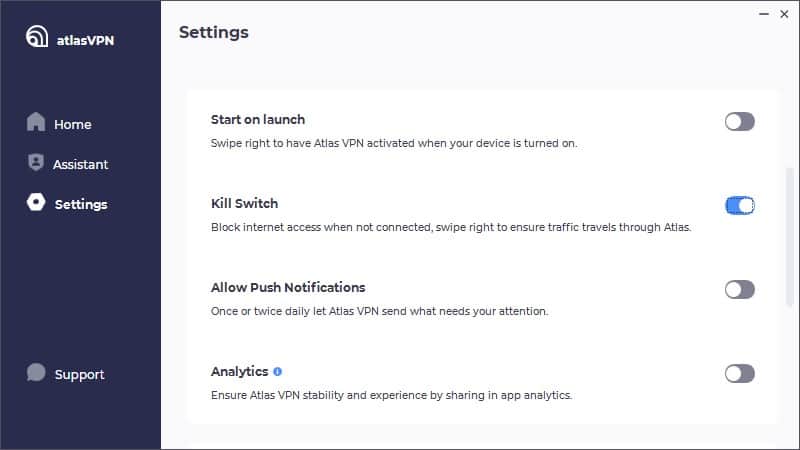
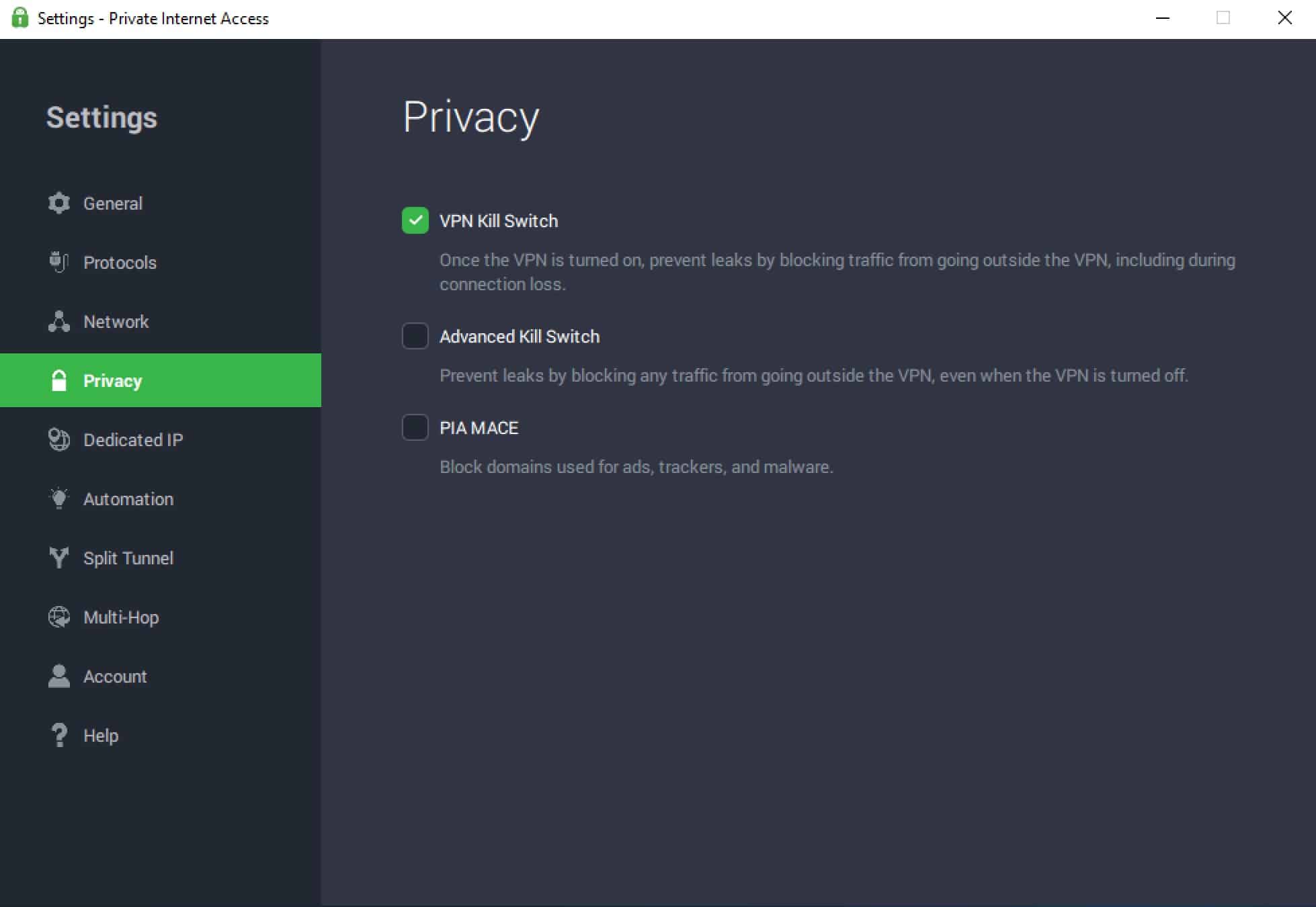
PIA and Atlas VPN both provide mobile apps for iOS and Android. They’re both easy to use and adequately designed for smaller screens.
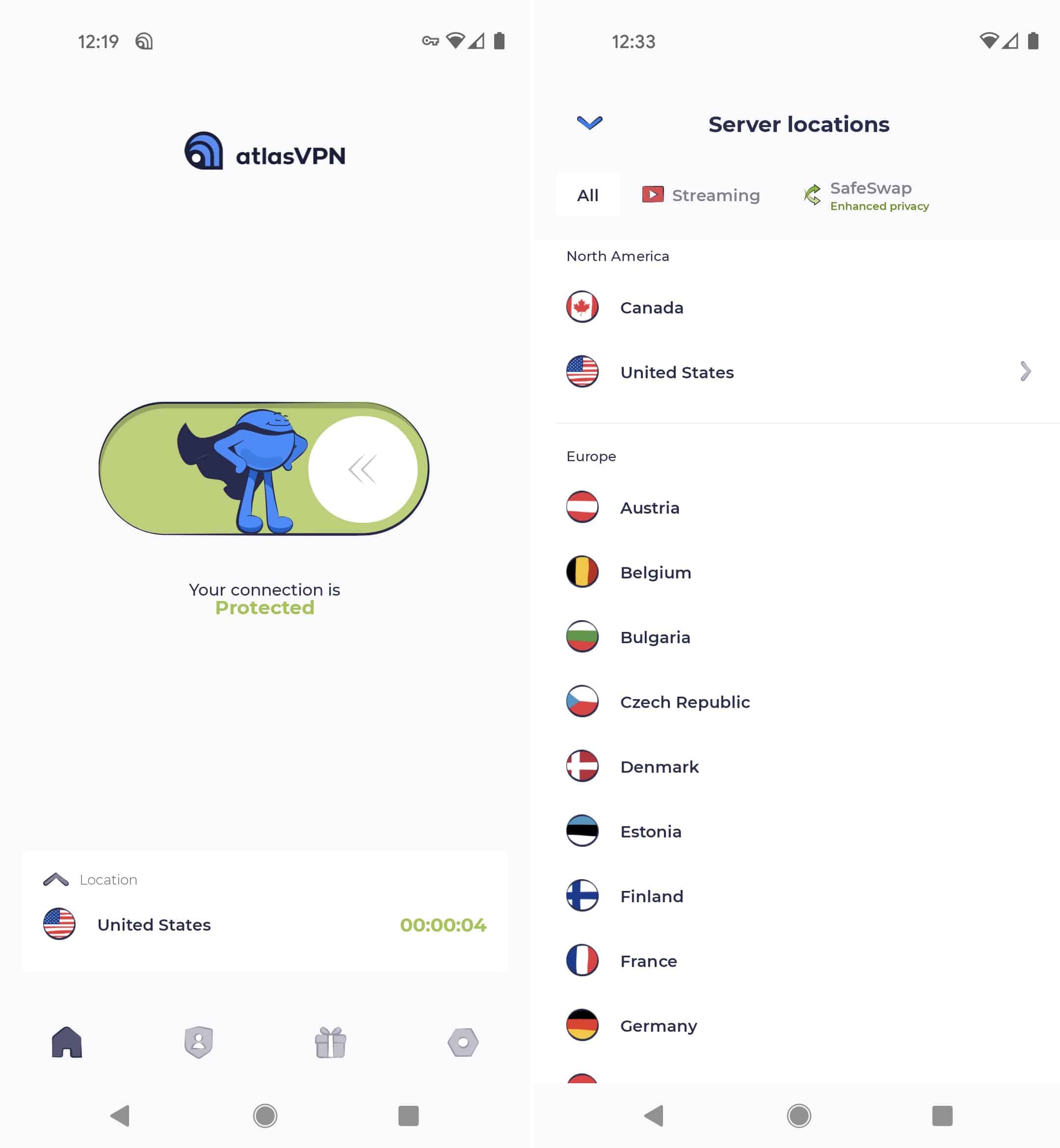
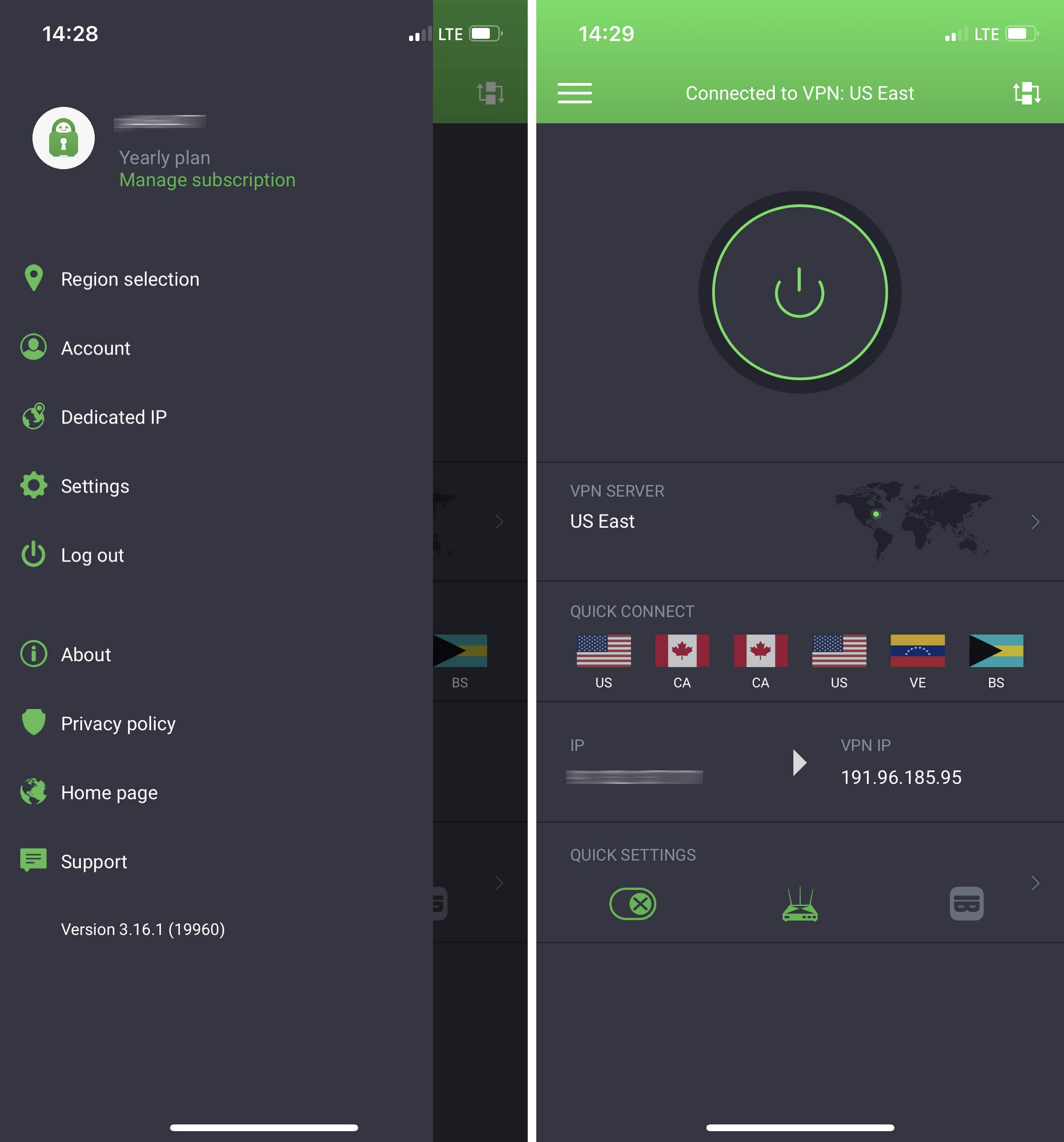
Servers
This one is going to be difficult to qualify because neither PIA nor AtlasVPN provides firm numbers on the actual size of their networks. But it’s fair to assume that PIA has the larger network of the two. Just looking at the number of countries in which both providers host servers, we can see that PIA is present in more than double the number of countries.
AtlasVPN, for its part, has a decent-sized network but one that’s smaller than PIA. Some users prefer smaller networks, while others prefer having a long list to choose from. So it really ends up being a question of personal preference. Either of these providers, in my opinion, will have more than enough VPN servers for most users.
Below is a list of countries where each provider hosts VPN servers:
| PIA | AtlasVPN | |
|---|---|---|
| Albania | ✔ | ✔ |
| Algeria | ✔ | |
| Andorra | ✔ | |
| Argentina | ✔ | ✔ |
| Armenia | ✔ | |
| Australia | ✔ | ✔ |
| Austria | ✔ | ✔ |
| Bahamas | ✔ | |
| Banglasdesh | ✔ | |
| Belgium | ✔ | ✔ |
| Bosnia and Herzegoniva | ✔ | |
| Brazil | ✔ | ✔ |
| Bulgaria | ✔ | ✔ |
| Canada | ✔ | ✔ |
| Cambodia | ✔ | |
| Chile | ✔ | ✔ |
| China | ✔ | |
| Columbia | ✔ | |
| Costa Rica | ✔ | |
| Croatia | ✔ | |
| Cyprus | ✔ | |
| Czech Republic | ✔ | ✔ |
| Denmark | ✔ | ✔ |
| Estonia | ✔ | ✔ |
| Egypt | ✔ | |
| Finland | ✔ | ✔ |
| France | ✔ | ✔ |
| Germany | ✔ | ✔ |
| Georgia | ✔ | |
| Greece | ✔ | |
| Greenland | ✔ | |
| Hong Kong | ✔ | ✔ |
| Hungary | ✔ | ✔ |
| Iceland | ✔ | ✔ |
| Ireland | ✔ | |
| Isle of Man | ✔ | |
| India | ✔ | |
| Indonesia | ✔ | |
| Italy | ✔ | ✔ |
| Israel | ✔ | ✔ |
| Japan | ✔ | ✔ |
| Latvia | ✔ | ✔ |
| Leichtenstein | ✔ | |
| Lithuania | ✔ | |
| Luxembourg | ✔ | |
| Macau | ✔ | |
| Malaysia | ✔ | |
| Malta | ✔ | |
| Mexico | ✔ | ✔ |
| Moldova | ✔ | |
| Monaco | ✔ | |
| Mongolia | ✔ | |
| Montenegro | ✔ | |
| Morocco | ✔ | |
| Netherlands | ✔ | ✔ |
| New Zealand | ✔ | ✔ |
| Nigeria | ✔ | |
| North Macedonia | ✔ | |
| Norway | ✔ | ✔ |
| Panama | ✔ | |
| Philippines | ✔ | |
| Poland | ✔ | ✔ |
| Portugal | ✔ | ✔ |
| Qatar | ✔ | |
| Romania | ✔ | ✔ |
| Serbia | ✔ | ✔ |
| Singapore | ✔ | ✔ |
| Slovakia | ✔ | ✔ |
| Slovenia | ✔ | ✔ |
| Spain | ✔ | ✔ |
| Sri Lanks | ✔ | |
| Saudi Arabia | ✔ | |
| South Africa | ✔ | |
| Sweden | ✔ | ✔ |
| Switzerland | ✔ | ✔ |
| Taiwan | ✔ | |
| Turkey | ✔ | |
| Ukraine | ✔ | |
| United Arab Emirates | ✔ | ✔ |
| United Kingdom | ✔ | ✔ |
| United States | ✔ | ✔ |
| Venezuela | ✔ | |
| Vietnam | ✔ |
Security
| PIA | AtlasVPN | |
|---|---|---|
| VPN protocols | OpenVPN, WireGuard, IKEv2 | WireGuard, IKEv2 |
| OpenVPN data encryption | AES-256 | AES-256 |
| OpenVPN control channel encryption | RSA-4096 | RSA-4096 |
| Cloaking technology | None | None |
| App security | Kill switch | Kill switch |
| DNS status | Private DNS | Private DNS |
Both providers in our shootout support secure VPN protocols. That’s OpenVPN, WireGuard, and IKEv2 for PIA, and WireGuard and IKEv2 for AtlasVPN. All of these VPN protocols are deemed very secure. I’d say that IKEv2, OpenVPN, and WireGuard are the three most secure VPN protocols we have today. However, of the three, OpenVPN is the most flexible of the three, so it would be nice to see OpenVPN support coming from AtlasVPN.
PIA and AtlasVPN both use 256-bit AES encryption with 4096-bit RSA keys for IKEv2 (as well as for OpenVPN for PIA). WireGuard uses newer ciphers that are also deemed very secure.
Both providers include a kill switch in all their apps (mobile and desktop). And both use their in-house no-logging DNS servers in the VPN tunnel by default.
So the only thing setting them apart in this category is PIA’s support for OpenVPN, which is relatively minor.
Privacy
| PIA | AtlasVPN | |
|---|---|---|
| HQ base | United States | United States |
| Connection logs | None | None |
| Activity logs | None | None |
| User details for sign-up | Email address | Email address |
| Anonymous payment options | Bitcoin, Litecoin, and Ethereum | Bitcoin, Ethereum, and Ripple |
Both our providers are based in the United States – the leader of the 5 and 14 Eyes Alliances, which are alliances between friendly nations that enable intelligence sharing. If your main reason for using a VPN is privacy, the above might put you off. But remember that both these providers have excellent privacy practices and collect very little data from their customers. And if they don’t collect the data, they can’t hand it over either.
As a security and privacy feature, AtlasVPN offers what it calls SafeSwap servers. SafeSwap servers automatically change their IP address anytime you navigate to a new website or app. You become much harder to track because the SafeSwap server’s IP address is continuously changing as you go about your online business. And as I mentioned above, AtlasVPN has been acquired by Nord Security (the maker of NordVPN), which means its privacy policy will soon be aligned with NordVPN’s excellent privacy practices. So I’d keep an eye on AtlasVPN – things will just get better from here.
As for PIA, it already has one of the best (and most precise) privacy policies out there. It only collects the following data points:
- Email address for the purposes of account management and protection from abuse
- Payment data for the purposes of processing payments as required by their third-party payment processors (PIA neither knows nor saves your full credit card details)
- State or territory and zip code for tax analysis
- Anonymized overall parameters needed for product delivery and optimization (server uptime, global number of users, bandwidth capacity, etc.)
So both PIA and AtlasVPN have excellent privacy practices, with PIA’s being the better one (for now). So I’ll give PIA a narrow win because its privacy policy is better, but nobody is blowing anyone out of the water. And it’ll be interesting to see how things compare once AtlasVPN is more closely aligned with Nord.
Configuration
| PIA | AtlasVPN | |
|---|---|---|
| Address allocation | Shared | Shared |
| Static IP address possible | No | No |
| DDoS protection | No | No |
| Ad & malware blocking | Yes | Yes |
Shared IP addresses are better for privacy than dedicated IP addresses. With shared IP addresses, all users on a given VPN server are assigned the same IP address (i.e., the server’s IP address). So the traffic from all those users appears to come from the same source. That makes it much harder to correlate any of that traffic to a specific VPN user.
Both PIA and AtlasVPN assign their users shared IP addresses by default to maximize user privacy.
They both also provide their users with an ad and malware blocker. And both providers use a technique called DNS blackholing to achieve the filtering. DNS blackholing works by checking your DNS requests against a list of known ad networks and malware domains. If any of those requests match, they get blocked. When they don’t match, the request is allowed to go through. It’s a feature I use daily, and I hope to see more VPN providers offer it moving forward.
Customer service
| PIA | AtlasVPN | |
|---|---|---|
| Live chat | No | No |
| Ticket support | No | No |
| Email support | Yes | Yes |
| Average email response time | 2.5 hours | 13 hours |
| Phone support | No | No |
| Searchable knowledge base | Yes | Yes |
| Video guides | No | No |
PIA and AtlasVPN provide email support and feature a searchable knowledge base on their respective websites. PIA used to offer live chat, but that option seems to have disappeared from its website. So regarding support channels, both providers are equivalent.
We wanted to test each provider’s response time with customer service emails. So we sent each provider three questions in three separate emails. The first two questions are common questions that shouldn’t be difficult to answer by a minimally knowledgeable support rep. The third question is deliberately more challenging to answer as it requires a deeper understanding of the ins and outs of VPNs.
Also, you’ll notice that the third question is different for each provider. That’s just because they don’t support the same features.
The results are below:
| PIA | |||
|---|---|---|---|
| Question | Initial response time | Number of emails | Question answered |
| What kind of logs does PIA keep? | 2.5 hours | 1 | Yes |
| PIA on a DD-WRT router? | 2.5 hours | 1 | Yes |
| What's the difference between the PIA app and the browser extension? | 2.5 hours | 1 | Yes |
| AtlasVPN | |||
|---|---|---|---|
| Question | Initial response time | Number of emails | Question answered |
| What kind of logs does AtlasVPN keep? | 13 hours | 1 | Yes |
| AtlasVPN on a DD-WRT router? | 13 hours | 1 | Yes |
| What's the difference between a proxy server and a VPN? | 13 hours | 1 | Yes |
PIA and AtlasVPN both answered my questions in under 24 hours (and under three, in PIA’s case). And their answers were polite, accurate, and to the point. They both also asked me if I needed help with anything else in all of their responses. But PIA’s response time was pretty stellar, and the answers it provided demonstrated a better understanding of VPNs. PIA’s answers were more detailed and thoughtful and even included links to support documents directly related to my queries.
So +1 to PIA, but I still felt that both providers’ customer support was very professional. And I have to admit that I was surprised that AtlasVPN would perform well in this category. In our full AtlasVPN review, written by my colleague, customer service was one of the provider’s biggest drawbacks. Always good to see an improvement.
The winner: AtlasVPN
Apps Available:
- PC
- Mac
- IOS
- Android
- Linux
- FireTV
Website: www.AtlasVPN.com
Money-back guarantee: 30 DAYS
AtlasVPN gets the win. Despite that fact, I want to reiterate that these are two excellent VPN providers. But PIA should really fix its speed issue – it was much faster in the past. And it becomes difficult to recommend a VPN provider that will slow your connection down, even if it performs exceptionally well in other areas.
AtlasVPN streaming support is orders of magnitude better than PIA. And while PIA offers a very generous ten simultaneous connections, AtlasVPN still beats it with its unlimited number of simultaneous connections. AtlasVPN has better prices than PIA across the board (though PIA is still a very affordable VPN service).
PIA bests AtlasVPN on privacy practices, customer support, and protocol support – PIA supports OpenVPN, whereas AtlasVPN does not. But that’s not going to be enough to put PIA over the edge.
So AtlasVPN takes it for the following reasons:
- AtlasVPN provides excellent streaming.
- AtlasVPN’s speeds are significantly faster than PIA’s.
- AtlasVPN allows for an unlimited number of simultaneous connections.
- PIA does have higher privacy and security standards. But, AtlasVPN’s security practices still provide a high level of privacy, and they’ll soon be aligned with NordVPN’s excellent privacy and security standards.
- AtlasVPN is cheaper across the board.
I would happily sign-up for either of these providers. I just feel that for your average VPN user, AtlasVPN will provide more bang for the buck.
See also:


